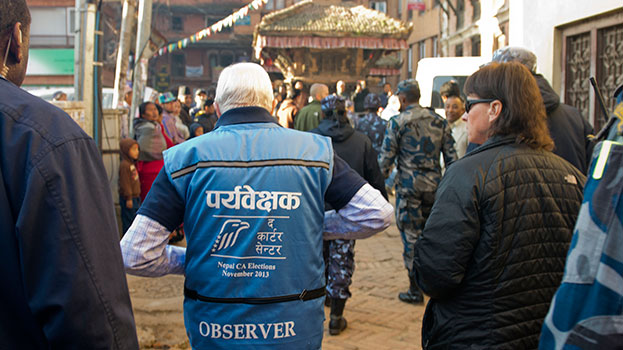“Poll observation in Nepal is superficial,” says Binod Sijapati, a political analyst and election-expenditure researcher.
In the 2017 elections, the commission had granted poll-observing permits to 53 national organizations but only 47 of them actually monitored the polls. And just 24 of these organizations submitted their election monitoring reports. There was also international monitoring from the likes of the European Union, the Carter Center, and the Asia Network for Free Elections (ANFREL). Representatives from Afghanistan, Bangladesh, Bhutan, India, Pakistan, Maldives, and Indonesia were invited as guest observers. It was Nepal’s first elections after adopting the federal set-up, in which 72 people were deployed as special observers, 1,434 as long-term observers, and 8,528 others as short-term observers. The election governing body issues short- and long-term permits to poll observers. The short-term observers mainly monitor the situation in the run-up to the vote while primarily focusing their assessment on the main election day. The long-term observers, on the other hand, will have the mandate to oversee the entire election process, including the vote-count. But Sijapati says most observers focus just on the election day. Election observers, he adds, routinely certify elections as fair and peaceful after cursory observation of polling stations. “Observers see the deployment of security forces, voters queuing up and the political party cadres helping the voters. That’s about it,” he says. “They fail to go beneath the surface.” Compared to other countries, Nepal has a track record of holding elections in a free and fair manner. Sijapati argues that this is because the poll observers have been endorsing elections in Nepal without really monitoring the electoral process. In the first Constituent Assembly (CA) elections held in 2008, the Carter Center had courted criticism for hurriedly endorsing the polls despite multiple incidents of vote-rigging and violence in several parts of the country. The center had submitted a positive election observation report, stating that despite some challenges the polls were held in a free and fair manner. “A few problems were observed regarding ensuring the secrecy of the vote, family voting, and improper assisted voting, but these cases were relatively isolated,” it had said in its preliminary observation report. Nepali politicians publicly confess to spending millions of rupees on electioneering. Use of political goons to capture voting booths and luring of voters with money and gifts are also common. But national and international organizations fail to monitor and report such activities Sijapati says poll observers either cannot identify these issues or they miss them as they are too focused on the election days. Many election-observing organizations also fail to abide by the laws and codes of ethics prepared by the EC. In 2017, for instance, only half of the organizations submitted their monitoring reports. As per the code of ethics, national and international poll observers should submit their preliminary report within the 15 days of elections and the final report within a month. But Pradip Pokharel, chairperson of Election Observation Committee Nepal, defends the works of the national and international observers. “International community awaits our reports to recognize or give legitimacy to Nepal’s elections,” he says. “The role of election observers in Nepal is pivotal.” He claims election observers do look into the issues that go beyond the voting day. “We provide valuable suggestions to make the election even more free, fair and less expensive. But the Election Commission ignores our recommendations,” Pokharel adds. Dolakh Bahadur Gurung, a former election commissioner, says the EC should strictly monitor the activities of the observers. “While we should discourage the observers from imposing impractical conditions,” he says. “They should also be made to submit their reports on time and to refrain from unethical practices.” Duties of observers -Observers shall at all times recognize and respect the custom, culture, and sovereignty of Nepal -Observers shall respect the election officials, and exhibit a respectful and courteous attitude towards election officials, voters, volunteers, and candidates -Observers must undertake their duties in an unobtrusive manner and not interfere with the election process -Observers shall refrain from influencing or providing guidance to persons involved in the electoral process/voting -Observers must observe the voting on polling day from a reasonable distance, and refrain from talking to voters inside the polling station and from asking voters about their political inclination -Observers shall not issue any disputable statement disturbing the operation of polling -Observers must refrain from slanderous or defamatory public statements regarding the ECN or any other electoral stakeholders or voters -Observers shall maintain due secrecy on the matters pertaining to voting and counting -Observer organization must submit a preliminary report within 15 days of the election and a final report within 30 days after the election result is published (Source: Election Commission)











